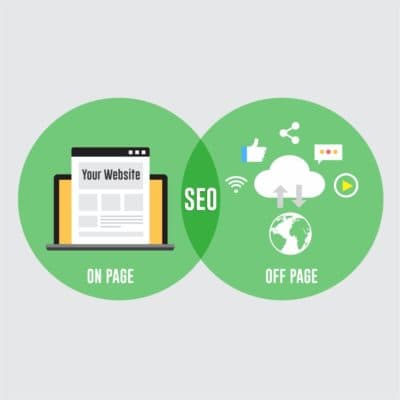Answered: What do on-page SEO and off-page SEO mean for your website? Source
What Do On-Page SEO and Off-Page SEO Mean?
What does it mean when your consultant says to you, “We’re going to do on-page SEO and off-page SEO”?
Are they needlessly throwing jargon at you, hoping you’ll buy-in to the process? Or is there something more important there for you to understand?
First of all, we hope the SEO process is being explained to you as it happens. However, there are a lot of terms that, while important, may go unexplained.
Never fear; here you’ll learn what on-page SEO and off-page SEO mean, and how they work together to support the overall goals of search engine optimization.
On-Page and Off-Page SEO Explained
How on-page and off-page SEO work together. (Source)
When you embark on an SEO strategy, your main goal is to get your website pages to rank higher on search engine results pages (SERPs). There are a number of ways you can help this along, and one of them is by doing both on-page SEO and off-page SEO work.
On-page SEO is all of the content on the page that is available for you to optimize.
This can include:
Page content
Headers
URL
Breadcrumbs
Site speed
Not all on-page elements are used on every page, so what is optimized for one page may be different for another.
For example, your site may not use breadcrumbs at all (but maybe it could be added), or you may only have images on some of the pages.
What’s important about on-page SEO is you understand what you can optimize, what can be added, and how to optimize judiciously.
Why is on-page SEO important? All of the optimization you do on the page is indexed by search engines, so it helps them better understand what is on the page and how to rank it. When done well, your on-page SEO can also help visitors stay on the page longer, reducing the bounce rate.
But that isn’t all search engines consider; one of the other elements is off-page SEO.
Off-page SEO is the optimization happening off the page and, in fact, happening off the site entirely.
At the core of off-page SEO are backlinks, which can come from:
Links to your page from another site
Mentions of your brand on another site
Shares of your content on another site
The theme here is another site, so your off-page SEO largely depends on the activities of other people on other sites. The exceptions are when you personally add your pages to business directories or link to them in a forum or when commenting on a blog post.
Most of the time, off-page SEO occurs with:
Social media posts
Influencer posts
Guest blogs
Brand mentions
Why is off-page SEO important? The backlinks you acquire, especially when they come from trustworthy and relevant sites (meaning relevant to your business or industry), build credibility for your own website. The more high-quality backlinks you have to your website pages, the more weight search engines give to your website – and the more likely you are to rank higher.
That’s Not All
Now that you understand what on-page SEO and off-page SEO mean, you can start using these elements to your advantage. It’s also important to understand there are many factors search engines take into account when ranking your pages.
We’ll be covering more of these ranking signals in the coming months. In the meantime, what questions do you have about improving your SEO? Tell us in the comments.

